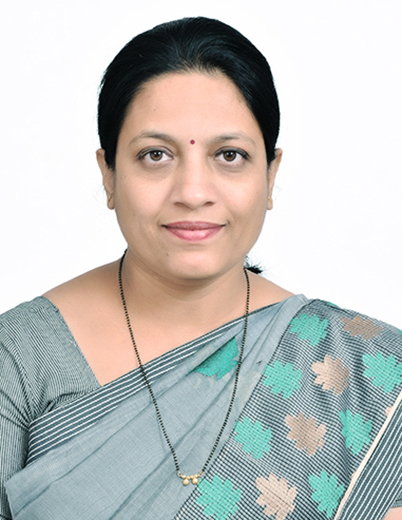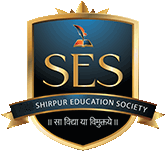Department of Electrical Engineering
-
Started
2012
-
Intake
60
-
DTE Choice Code
517229310

Prof. Dr. Shailaja Arjun Patil
Head of Department
The Department of Electrical Engineering at R. C. Patel Institute of Technology (RCPIT), Shirpur was established in June 2012 under the umbrella of The Shirpur Education Society. In a relatively short span, the department has built a strong reputation for its academic excellence, placement success, and student-centric approach.
With a dedicated and experienced faculty team, the department offers specialized knowledge in areas such as Power Quality, Electrical Machines, Power Electronics, Electrical Drives, and Power Systems. The department follows a project-based learning approach, encouraging students to apply theoretical concepts in practical scenarios, thus ensuring they are well-prepared for industry and research.
Electrical Engineering, being a core branch, plays a vital role in the technological and economic growth of the country. The department’s curriculum provides a deep foundation in control systems, power generation, high voltage engineering, electrical machines, and circuit analysis, with a strong emphasis on adaptability to emerging technologies.
Vision
- To build electrical engineers with a global perspective and a strong dedication to societal service.
Mission
- M1: To transform students from diverse backgrounds into skilled electrical engineers.
- M2: To enhance industrial interaction to meet the changing industrial needs.
- M3: To serve society with deep awareness of social responsibilities and ethical values.
Program Educational Objectives (PEOs):
- PEO1: To develop an ability among the graduates for applying knowledge of electrical Engineering with a multi-disciplinary approach.
- PEO2: To prepare graduates having entrepreneurial skills, and motivation for higher Studies and Lifelong learning.
- PEO3: To inculcate ethical and social values in students to become socially responsible human beings.
Programme Specific Outcome (PSOs) and PI
- PSO-1 Apply basic knowledge related to electrical engineering domain.
- PI-1 Apply theory and principles of an electrical engineering problems power system, electrical machines, electrical drives, and power electronics.
- PI-2 Apply laws of basic science to an electrical engineering in analog and digital electronics, microprocessor and microcontroller, control system.
- PSO-2 Demonstrate proficiency in the use of modern engineering tools required in real-life applications.
- PI-1 Create/adapt/modify/extend modern engineering tools and techniques to solve complex engineering problems.
Key Highlights of the Department
- Qualified Faculty: 4 out of 9 faculty members hold Ph.D. degrees, with expertise across key domains of electrical engineering.
- Graduate Success: Over 590 students have graduated from the department and are contributing to government, public, and private sectors.
- Research Output: 90+ research papers published in reputed journals and 36 conferences; 13 + patents filed or granted.
- Academic Achievements: 25+ university toppers, 3 gold medalists, and a history of consistent academic performance.
- MOOCs & Certifications: Active participation in NPTEL, SWAYAM, and other online certification platforms for advanced technical learning.
- Foreign Language Skills: Students have made notable progress in foreign language training, including Japanese, enhancing global employability.
- Placement Preparedness:
- Dedicated faculty for training and placement coordination
- Active participation in central soft skill and aptitude training
- Mock interviews, aptitude test sessions, and resume building workshops
- Hackathons & Competitions: Students have won accolades at events such as KPIT Sparkle and other national-level hackathons.
- Industry Connect:
- Industrial visits to core electrical industries for hands-on exposure
- Workshops by industry experts and alumni on the latest trends
- B.Tech. (Hons.) specializations and Minor Degrees in Computer Engineering offered to diversify academic scope.
- Alumni Engagement: Strong alumni network that actively participates in mentoring and corporate interactions on campus.
Infrastructure & Laboratory Facilities
- M1: To transform students from diverse backgrounds into skilled electrical engineers.
- M2: To enhance industrial interaction to meet the changing industrial needs.
- M3: To serve society with deep awareness of social responsibilities and ethical values.
Program Educational Objectives (PEOs):
- PEO1: To develop an ability among the graduates for applying knowledge of electrical Engineering with a multi-disciplinary approach.
- PEO2: To prepare graduates having entrepreneurial skills, and motivation for higher Studies and Lifelong learning.
- PEO3: To inculcate ethical and social values in students to become socially responsible human beings.
Programme Specific Outcome (PSOs) and PI
- PSO-1 Apply basic knowledge related to electrical engineering domain.
- PI-1 Apply theory and principles of an electrical engineering problems power system, electrical machines, electrical drives, and power electronics.
- PI-2 Apply laws of basic science to an electrical engineering in analog and digital electronics, microprocessor and microcontroller, control system.
- PSO-2 Demonstrate proficiency in the use of modern engineering tools required in real-life applications.
- PI-1 Create/adapt/modify/extend modern engineering tools and techniques to solve complex engineering problems.
Key Highlights of the Department
- Qualified Faculty: 4 out of 9 faculty members hold Ph.D. degrees, with expertise across key domains of electrical engineering.
- Graduate Success: Over 590 students have graduated from the department and are contributing to government, public, and private sectors.
- Research Output: 90+ research papers published in reputed journals and 36 conferences; 13 + patents filed or granted.
- Academic Achievements: 25+ university toppers, 3 gold medalists, and a history of consistent academic performance.
- MOOCs & Certifications: Active participation in NPTEL, SWAYAM, and other online certification platforms for advanced technical learning.
- Foreign Language Skills: Students have made notable progress in foreign language training, including Japanese, enhancing global employability.
- Placement Preparedness:
- Dedicated faculty for training and placement coordination
- Active participation in central soft skill and aptitude training
- Mock interviews, aptitude test sessions, and resume building workshops
- Hackathons & Competitions: Students have won accolades at events such as KPIT Sparkle and other national-level hackathons.
- Industry Connect:
- Industrial visits to core electrical industries for hands-on exposure
- Workshops by industry experts and alumni on the latest trends
- B.Tech. (Hons.) specializations and Minor Degrees in Computer Engineering offered to diversify academic scope.
- Alumni Engagement: Strong alumni network that actively participates in mentoring and corporate interactions on campus.
Infrastructure & Laboratory Facilities
- PSO-1 Apply basic knowledge related to electrical engineering domain.
- PI-1 Apply theory and principles of an electrical engineering problems power system, electrical machines, electrical drives, and power electronics.
- PI-2 Apply laws of basic science to an electrical engineering in analog and digital electronics, microprocessor and microcontroller, control system.
- PSO-2 Demonstrate proficiency in the use of modern engineering tools required in real-life applications.
- PI-1 Create/adapt/modify/extend modern engineering tools and techniques to solve complex engineering problems.
Key Highlights of the Department
- Qualified Faculty: 4 out of 9 faculty members hold Ph.D. degrees, with expertise across key domains of electrical engineering.
- Graduate Success: Over 590 students have graduated from the department and are contributing to government, public, and private sectors.
- Research Output: 90+ research papers published in reputed journals and 36 conferences; 13 + patents filed or granted.
- Academic Achievements: 25+ university toppers, 3 gold medalists, and a history of consistent academic performance.
- MOOCs & Certifications: Active participation in NPTEL, SWAYAM, and other online certification platforms for advanced technical learning.
- Foreign Language Skills: Students have made notable progress in foreign language training, including Japanese, enhancing global employability.
- Placement Preparedness:
- Dedicated faculty for training and placement coordination
- Active participation in central soft skill and aptitude training
- Mock interviews, aptitude test sessions, and resume building workshops
- Hackathons & Competitions: Students have won accolades at events such as KPIT Sparkle and other national-level hackathons.
- Industry Connect:
- Industrial visits to core electrical industries for hands-on exposure
- Workshops by industry experts and alumni on the latest trends
- B.Tech. (Hons.) specializations and Minor Degrees in Computer Engineering offered to diversify academic scope.
- Alumni Engagement: Strong alumni network that actively participates in mentoring and corporate interactions on campus.
Infrastructure & Laboratory Facilities
- Dedicated faculty for training and placement coordination
- Active participation in central soft skill and aptitude training
- Mock interviews, aptitude test sessions, and resume building workshops
- Industrial visits to core electrical industries for hands-on exposure
- Workshops by industry experts and alumni on the latest trends
The department offers world-class infrastructure tailored for modern technical education:
- Fully air-conditioned smart classrooms equipped with smart boards and high-speed internet.
- 7+ laboratories designed with ergonomic furniture and modern instruments, including:
- Electrical Machine Lab
- High Voltage Engineering Lab
- Microprocessor, Power Electronics and Analog Digital Electronics Lab
- Electrical Measurement, Network Analysis and Project Lab
- PLC and Control system Lab
- Computer Lab with software tools like MATLAB, SCILAB, Python
- Electrical Drives, Power system, and Switchgear Protection Lab
Teaching–Learning Pedagogy
- ICT-enabled teaching using MOODLE, Smart Boards, and virtual labs.
- Access to national and international e-learning platforms: SWAYAM, NPTEL, Coursera (Stanford University) and CodeChef learn and coding platform.
- Local Guardian Mentoring System for personalized student guidance and support.
Student Development & Learning Culture
- Emphasis on project-based learning to bridge the gap between theory and application.
- Support for participation in technical events, innovation competitions, and government skill initiatives.
- Close faculty mentorship and continuous performance tracking for academic and personal development.
- Encouragement for entrepreneurship, higher education, and research projects.
- Emphasis on project-based learning to bridge the gap between theory and application.
- Support for participation in technical events, innovation competitions, and government skill initiatives.
- Close faculty mentorship and continuous performance tracking for academic and personal development.
- Encouragement for entrepreneurship, higher education, and research projects.
The Department of Electrical Engineering at RCPIT is committed to developing professionals who are technically proficient, ethically responsible, and globally competent. With a strong foundation in academics, hands-on training, and industry alignment, the department equips its students to meet the challenges of a rapidly evolving energy and technology sector.
